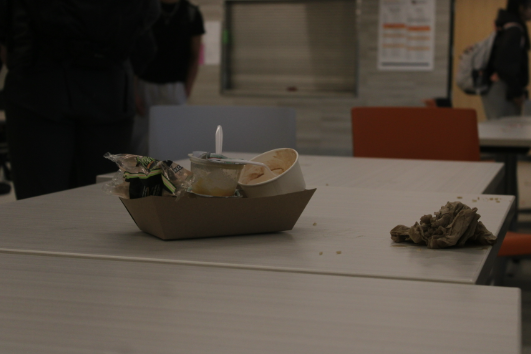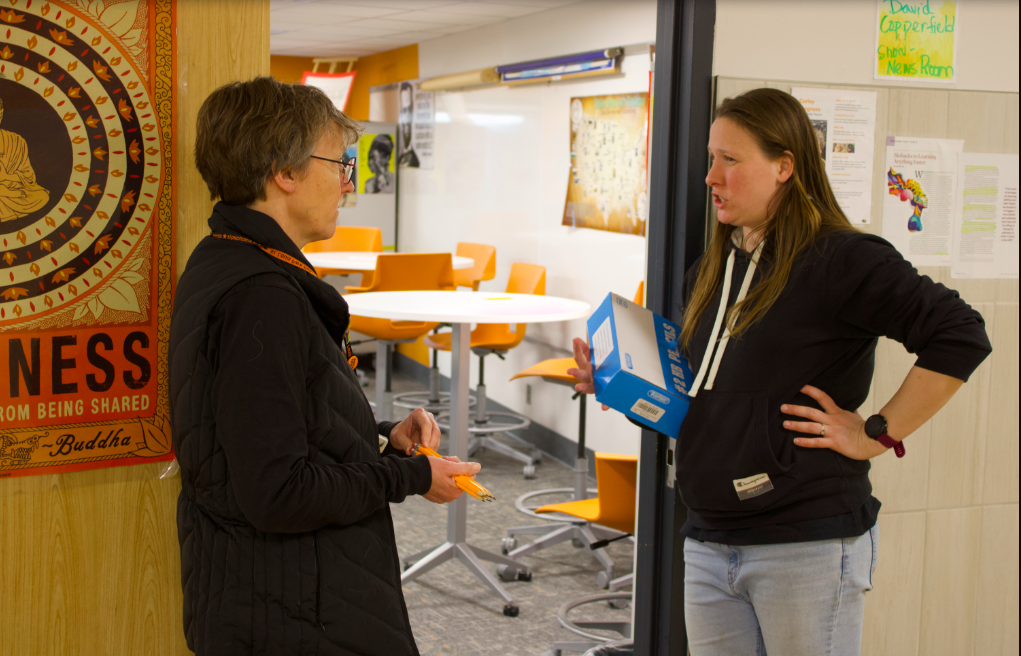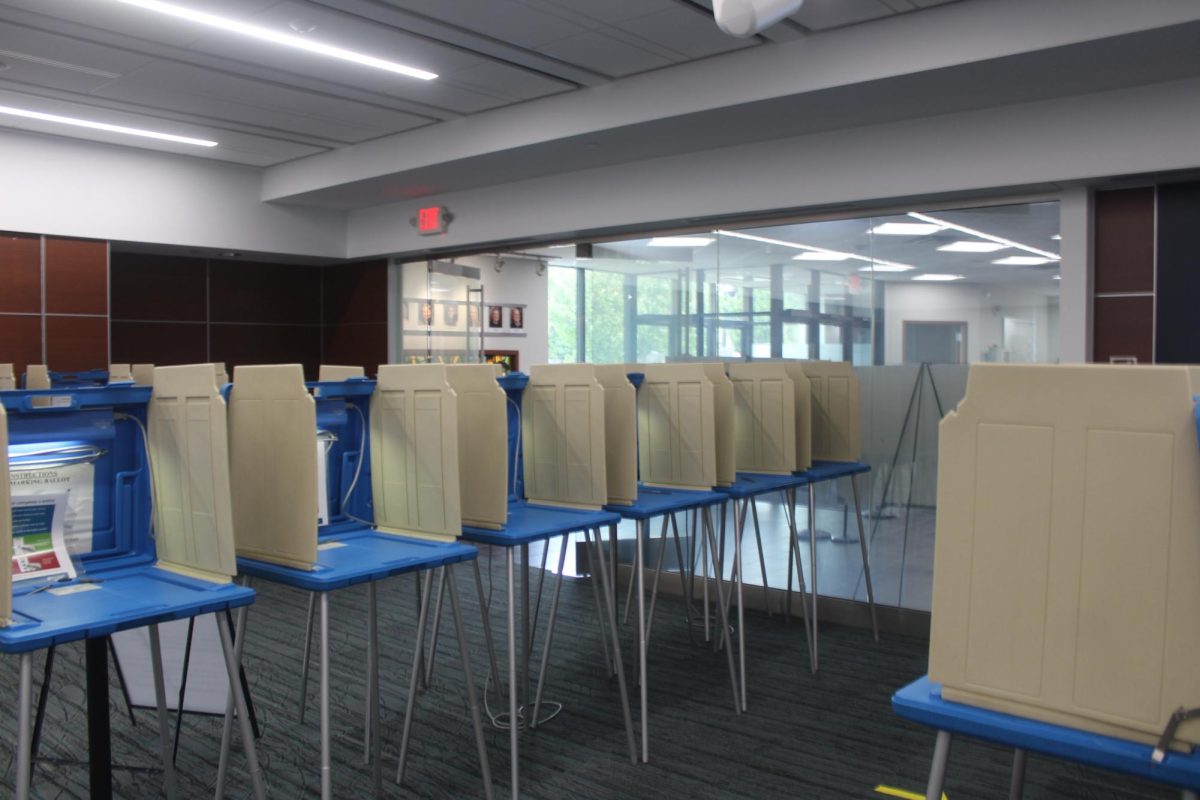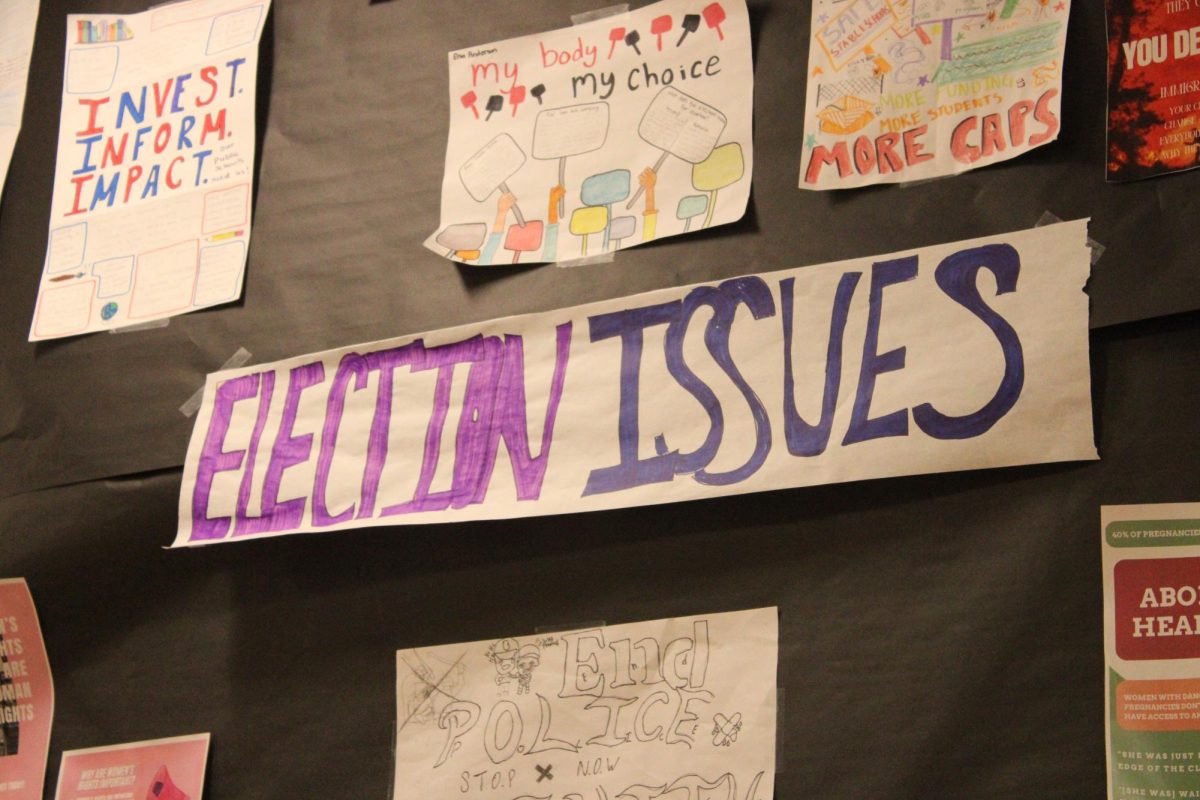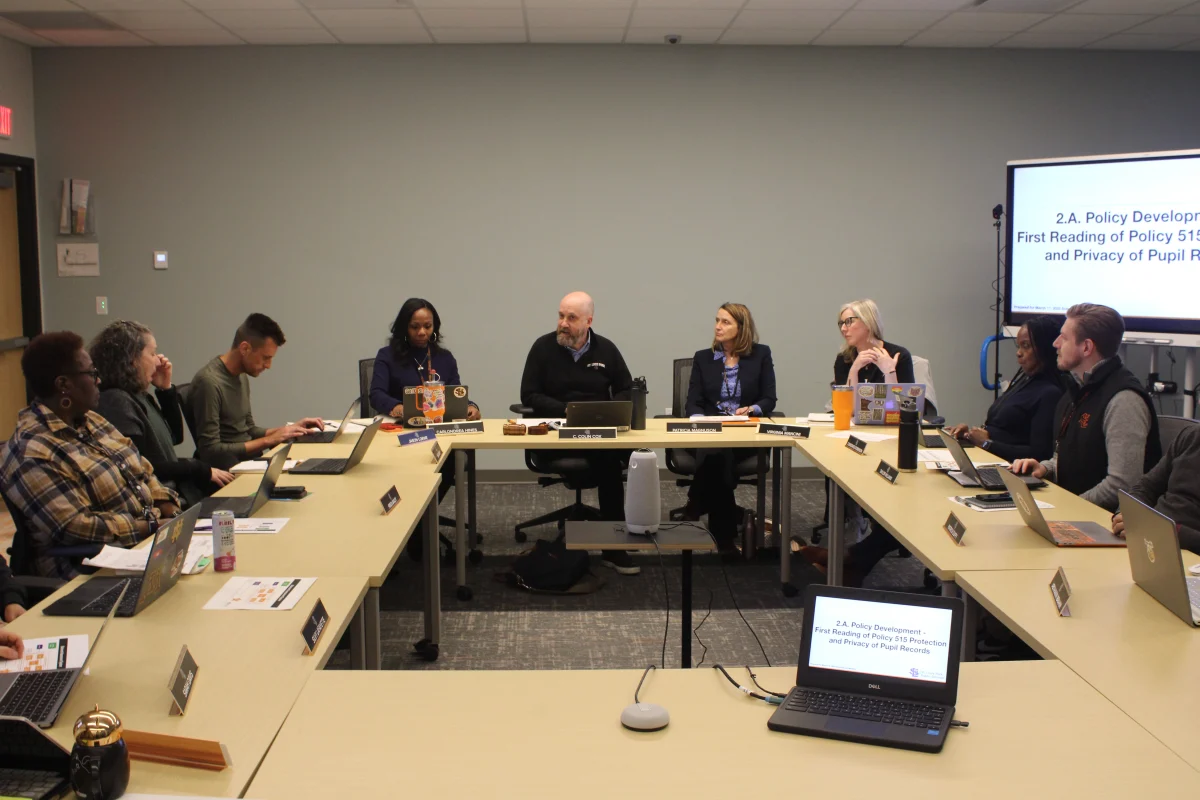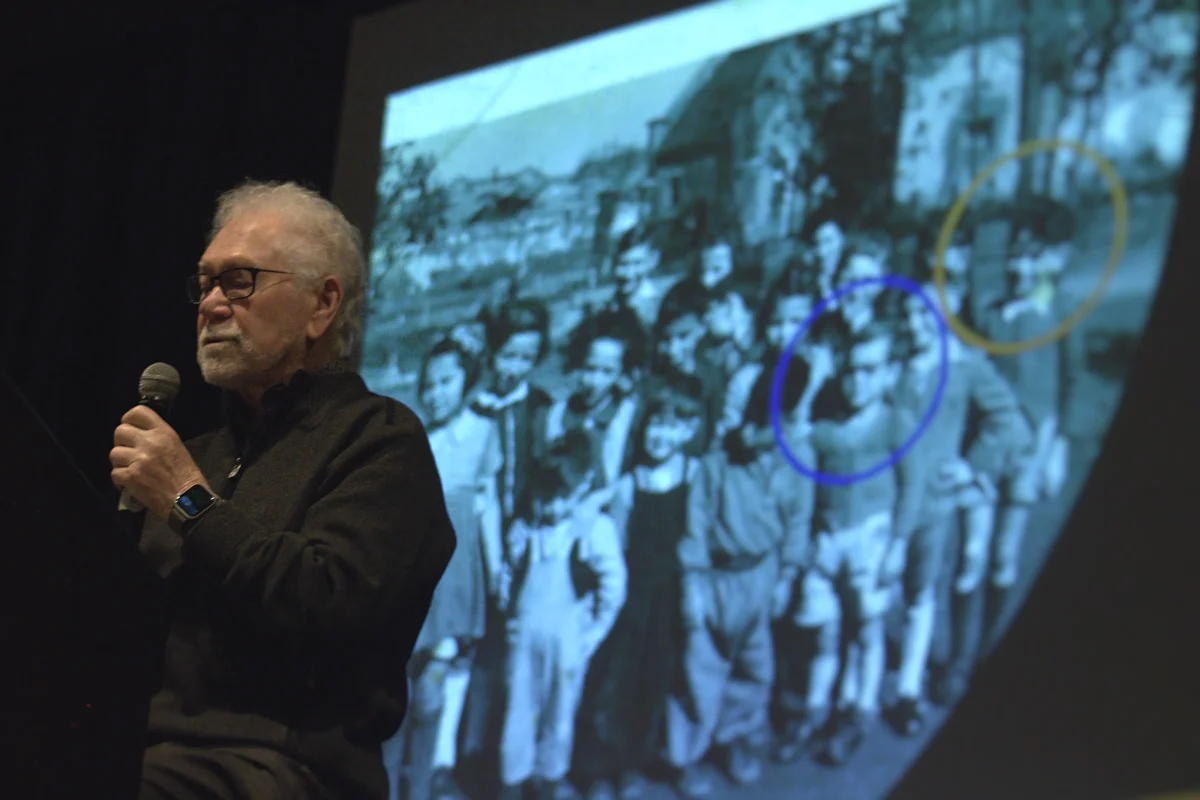The IB diploma dilemma
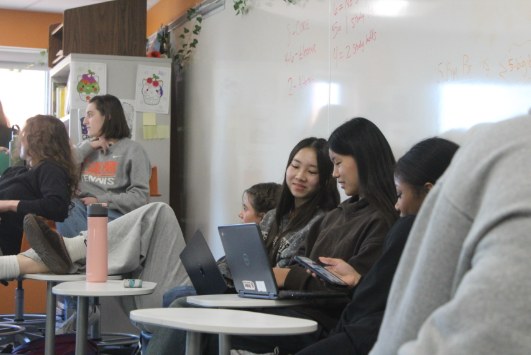
According to principal LaNisha Paddock, the IB Diploma Programme at Park enables students to think globally and critically, ultimately fostering well-rounded individuals. She said IB offers students an opportunity to learn in ways that differ from those typically implemented in schools.
“I fell in love with the IB program in the way that we built global and critical thinkers and thinking about how we learn,” Paddock said. “The value (of) IB is offering students learning spaces to process information differently than how we always have in traditional education. It’s building that well-rounded and lifelong learner.”
According to social studies teacher and department head Jill Merkle, IB courses are more open-minded and more adaptable to teaching than Advanced Placement (AP) classes. She said AP is more driven by notes and memorization, while IB, still an advanced class, allows for a different learning style.
“The benefits of IB are that, as an IB teacher, it is much more flexible than teaching an AP class, of how I teach, what ways to teach and how to think,” Merkle said. “I prefer teaching IB and there (are) students that are like, ‘Oh, I love AP, and I love the grind of AP,’ but it’s going to be notes and tests and IB gives a different avenue to learn while also still being rigorous.”
Junior and IB Diploma candidate Elliott Netoff said the IB Diploma Programme is intense and has a larger workload for students, but it can be very beneficial in the long run. They said it allows students to push themselves to achieve higher and learn lifelong skills if participants put in the effort.
“It’s hard and there isn’t a way to sugarcoat that. It’s a hard path to go down, but in the end, it will help you grow and become a better student. I’ve seen many people push themselves and find out what they can achieve in school. I have learned how to become a better writer,” Netoff said. “The diploma is very achievable and if you really decide to put the effort in, you can do it.”
Laura Saavedra Myers, Assistant Director of Minnesota Recruitment at the University of Minnesota-Twin Cities, said taking advanced classes like IB courses and other advanced pathways are crucial for a college application. She said students who challenge themselves are the ones that stand out in the admissions process.
“At the U of M, we consider IB coursework rigorous, challenging, college-level coursework. When reviewing applications, we want to make sure that students are well prepared. We want to see students challenging themselves, taking advantage of whatever challenging coursework is available to them within the context of their high school. That could be AP courses, IB courses, etc. That is all very good to us,” Saavedra Myers said. “Different colleges have different philosophies about what they do regarding advanced classes. For us, it shows that a student is choosing to take tougher classes, and that can only help them in our admissions process, assuming they do well in those courses.”
According to business teacher Abby Lugo, the IB program at Park is modulated well because professionals from IB come and check that everything is in place. She said there are enough options for students to have and that there are even required classes to offer students at Park.
“It’s definitely a developed program because it’s all regulated. We have the IB people that come in and they make sure that we’re offering enough courses, that we’re all certified, and so that part is there and that part is valid,” Lugo said. “There are enough options because we just had to add in options. I’m in category six, so that’s why we have IB Business and Management this year, and so we are now adhering to the required options to give students.”
Netoff said the IB program’s curriculum allows students to learn about multiple perspectives worldwide instead of focusing on only one point of view. They said IB classes teach students to work harder and push themselves to their full potential by learning how to manage work and fulfill higher expectations.
“When it comes to the content of the classes, there’s more. We don’t just cover one perspective and the curriculum gives us multiple points of view. The program centers around being globally minded and not just thinking about your own culture and experience. You learn how your culture and other cultures affect your point of view on the world. That’s what makes the IB diploma so great and why I decided to do it,” Netoff said. “You learn how to manage your work for all of your classes while learning how to do better work. The expectations are higher, and the program pushes you to become a better student.”
Senior and IB Diploma candidate Jude Sadovsky said the IB Diploma Programme offers a wide variety of benefits for students. He said it provides skills that you may not find in other classes like learning how to open your mind and have better conversations with others while developing a deeper understanding of the topics you learn about.
“IB courses and the IB Diploma Programme teach you life skills that can be applied in different areas, whereas AP classes can feel like answering a lot of questions that don’t provide the same kind of depth and understanding of the topics you are learning about,” Sadovsky said. “Theory of Knowledge engages your critical thinking and your awareness of topics in the world that you may learn about in IB classes. You can ask questions about anything and it is useful for students for the future with understanding and communicating.”
According to junior Lee Cadigan, IB helps students learn how to make connections and do analytical work. She said other classes she takes are more based on learning facts rather than analyzing.
“It really helps somebody learn how to properly analyze and make connections between stuff. A main difference I see is in my IB classes this year I’ve done a lot more analytical work,” Cadigan said. “I understand the content a lot more because most of what we do is analyze, rather than just learning facts.”
According to Saavedra Myers, the level of coursework that students in advanced programs like IB will come to college with skills they have already learned from those more rigorous classes. She said the transition to college will be much smoother because they have already adapted to more difficult material and a heavier workload.
“That level of work is so close or equal to what students experience in college, it just makes the ease of transition so much smoother because students are already performing at a very high level. They know how to ask meaningful questions, they’re strong writers and they have a good work ethic,” Saavedra Myers said. “They are no stranger to a more intense syllabus. They’ve developed those skills already because they take harder classes, and that pays off for them when they get here.”
Senior IB Diploma candidate Ian Bautista Reuland said Park compensates students and gives them a partial fee waiver for the test price, but the cost may still deter students from participating in the program. He said in the long run, the money spent on the tests will save students money in college, considering college credits are thousands of dollars, not hundreds.
“The financial situation is better for our school than in most other schools, where it’s $110 per test, so there is that for perspective. Generally speaking, (the cost) can discourage some people but if all your scores are good (and) you get the full diploma, it definitely pays off with the amount of college credit you get,” Bautista Reuland said. “You spend maybe a couple $100, but then you save thousands in the future and even if there are certain situations where there’s like financial stress to do it, it’s free, if that (is the) case, or at least, they might give a discount if you’re able to give a reason for it. For the most part, yes, it can seem very expensive for what is only a possibility.”
According to Lugo, the pricing depends on the number of students who are a part of the IB Diploma candidacy and whether that equates to an amount Park administration is willing to spend when not everyone takes advantage of the program.
“(For example), if we look at $12,000 divided by around (the) six (candidates we have this year), we’re spending $2,000 per candidate. Or looking at in all IB classes, there are 200 students and divide that by $12,000 (to find what it is per student)—seeing if that would be a comfortable number for the school. (We have to ask) ‘how much do we spend on a student that’s taking 14 credits a year? What is the average cost per class?’ Then compare that to the IB. At that point, that’s just the cost for us to run the IB program, so that doesn’t cover any of the training costs that go into it, or, the FTE (full-time equivalent) of that teacher, or anything else,” Lugo said.
According to Merkle, the philosophy behind IB benefits teachers, but it’s not the only way to achieve that comprehensive philosophy. She said with budget cuts being a current matter, the courses needed to become an IB teacher were expensive.
“IB’s philosophy is really good and for a lot of teachers going through that (process of becoming an IB teacher) and understanding that philosophy is really helpful,” Merkle said. “At the same time, there are other ways for teachers to learn and get that holistic philosophy. So, yes, it’s beneficial, but I wouldn’t say it’s the only way to do teacher training, and it was costly (considering) we’re looking at a time of budget cuts.”
According to Lugo, even if a teacher instructs a more advanced class, it goes onto their annual payment the same as if they were teaching a normal class. She said her payment is determined by experience and education.
“It just goes into my FTE, so I don’t get anything extra for teaching an AP or an IB course, or (for) being trained more because my pay is simply on my full-time employment. So usually a teacher is a 1.0 and then you would teach five classes a day with one supervision for both semesters,” Lugo said. “As far as my pay, it’s calculated out by how much education I have and how many years (of) experience I have, so there’s no bonus for teaching a higher level course like that.”
Bautista Reuland said the IB Diploma Programme will provide students who participate with more college credits than AP if they’re successful in the program. He said with this college credit, students have the ability to skip a couple of years or beginner-level college courses at the bare minimum.
“Generally speaking, if you are going for higher education—college, university—the IB Diploma, in terms of pure (college) credits, gives you potentially more than AP could ever give you if you both pass the diploma and all your tests,” Bautista Reuland said. “That means you get five out of seven potential points—that will give you the ability (to) almost skip two entire years of college and go by those for free, or you will at least be able to skip starter level classes instead of having to do starter level classes all over again.”
Saavedra Myers said college credits are not given for IB courses when it comes to every class and can depend on the college. She said she’s seen AP credits are more transferable than IB, and AP is the more common advanced pathway seen at the University of Minnesota-Twin Cities Office of Admissions.
“The U of M does award credit for IB, but it depends on the course. We are made up of several colleges, and the colleges may decide what they want to accept in those three tracks of AP, PSEO (Post-Secondary Education Option) and IB with credits,” Saavedra Myers said. “I get the sense that more AP credits transfer than IB credits, and I believe we see a lot more AP coursework than we do IB. Maybe if we got more IB applicants, colleges would start to expand that list of credits they would be willing to take for students to save money on those credits.”
Paddock said the administrative board aims to enhance students’ accessibility to the IB Diploma, considering the program’s advantages. She said they want students to feel confident in their ability to prosper in IB-level classes.
“One of the goals (has) been to make it more accessible. (The IB Diploma) is something that offers a lot of value,” Paddock said. “Even if it’s not ensuring that more students complete the full diploma, but ensuring that more students feel as though they have the opportunity to be successful in IB classes.”
Bautista Reuland said Park hasn’t attempted to increase the accessibility of the IB Diploma and there hasn’t been much awareness brought up about the program. He said there’s little advocacy for the program and that the program can be confusing.
“I don’t think they’ve tried to make it easily accessible, especially with the acknowledgement of, ‘Hey, we do this,’ because I haven’t seen a single report on it. I haven’t seen anything except for a single blurb on their website, and even if you go to the website, it’s very confusing,” Bautista Reuland said. “Commonly enough, you might end up missing one part of (the diploma), and then you have to completely either reschedule before the next year or you just can’t do it.”
According to Merkle, the IB coordinator, Faduma Adeed, has recruited many students to participate in the program. She said many current 11th graders and more students of color are candidates.
“Faduma Adeed, our (IB) coordinator, has been wonderful and supportive of students and has been getting lots of different students into IB,” Merkle said. “You can see that with the 11th grade class, for instance, right now there’s a lot more students, and a lot more students of color too. She’s doing a really good job supporting and encouraging kids.”
Sadovsky said the awareness of the IB Diploma Programme has limited the number of candidates every year. He said to raise awareness, the current candidates present to 10th grade students to tell them more about the program. He said if Park reached out more to families about this opportunity for students, it could raise numbers even higher.
“One thing we did to raise awareness and accessibility for the program is something called the cast project. For the past couple of years, candidates have made a slideshow and presented it to 10th grade English classes so that when they registered, they could think about the IB Diploma Programme. It raised our numbers for participating juniors to 25 candidates, which is really good. Besides that, there isn’t much awareness about the program,” Sadovsky said. “To raise awareness about the program, the school could put information in a newsletter or have teachers talk about it with their students.”
Paddock said Park is working to improve accessibility in the IB Diploma by gathering feedback and addressing gaps in the program. She said they are organizing different courses so that when they offer a class to the students, they can implement it.
“Being planful about ensuring that we only put offerings in front of students to choose if we know or feel good about being able to staff them—we can’t run a class of seven students. That’s just not budget conscious,” Paddock said. “Consulting with multiple people, getting feedback, trying to figure out where the student lies, where some of the gaps in our programming are and how we (can) ensure that this increases accessibility.”
According to Merkle, with the required courses students need to take to fulfill their IB Diploma needs, students’ elective options can be limited, and they may be challenged to schedule all of their classes accordingly. She said although it’s difficult, the students who are driven to get their diploma are working around the struggles and still finding ways to participate in the classes they enjoy.
“(The IB Diploma Programme hinders students from taking other classes) to an extent, and scheduling is hard. When they’re trying to make sure that none of the IB classes are at the same time, it can be really hard for students to be a part of a lot of things,” Merkle said. “At the same time, a lot of times the kids choosing to do the IB Diploma are figuring out ways to still be able to do things they’re passionate about.”
Bautista Reuland said the IB Diploma curriculum that Park offers is limiting for students since Park offers eight IB classes, and the diploma candidates are required to take seven. He said the schedule of an IB Diploma candidate is very restricted, and classes are practically pre-selected.
“The curriculum, for the most part, does not make it easy (for students) because you have eight classes you can choose from, and you have to do seven,” Bautista Reuland said. “Essentially all your classes are already picked for you. There is no choice with your schedule, especially in your senior year.”
Lugo said the district or administration at our school needs to examine the other opportunities that are given and how students drift off, with very few becoming IB Diploma candidates. She said parts of the program are strong and it has developed, but said she wonders if we’re meeting our goal relating to cost and students fulfilling the diploma.
“The program is something that the district office needs to analyze, or even our administration. It’s important to look at other opportunities we have for students. When we say we’re focused on IB being for all, I do find it troubling that we have strong PYP (Primary Years Programme) programs, and we morph into this MYP (Middle Years Programme). When students get to high school, only a small number of them end up being IB (Diploma) candidates,” Lugo said. “So while aspects of the program are strong, and it’s developed, when we look at the overall cost and the overall goal, (the question is) are we meeting that? Are we measuring the goal about how many students are getting the diploma, or are we looking at if the IB mindset is worth the money?”
According to Saavedra Myers, the diversity in IB applicants to the University of Minnesota-Twin Cities grows every year and there is a wide variety of students who come from different backgrounds who have participated in the IB Diploma Programme.
“Every year, the diversity of our applicant pool increases in all meanings of the word diversity, racially, ethnically, religiously, politically, etc. I am confident that if we were to look at the IB applicants, we’d see a similar swatch of diversity represented,” Saavedra Myers said.
According to science teacher Alex Polk, for students who are trying to achieve the end goal of the IB Diploma, many resources and teachers at the school support students and guide them through their decisions and work throughout the program.
“If students are trying to pursue the diploma, accessibility comes with trying to be supportive with the extended essay and making sure that there’s somebody that’s going to be able to be that guide for them as they’re going. But then with other IB classes—SL (standard level) and HL (higher level)—making sure teachers are trying to support the students as they’re pursuing that path because it is so much time, and being able to be there to bounce ideas off of each other,” Polk said. “As they try to figure out which SL and HL classes they end up taking and how they’re going to operate through TOK (Theory of Knowledge), how they’re going to operate through the extended essay. Along with that, recognizing that Ms. Adeed, Ms. Kregness and Ms. Tsuchiya all try to help students through that process with extended essays and TOK with our connections for the diploma students.”
According to Polk, IB begins at the elementary age. He said the middle years program and diploma only start once a student is in 11th and 12th grade.
“It probably starts at the elementary level, since we are in IB world schools at elementary and then middle school as well. We do have, to some and myself included, an awkward gap at freshman and sophomore because we don’t have the middle years program at ninth grade and 10th grade. The middle years program is through 10th grade and then the diploma starts at 11th and 12th grade,” Polk said.
Cadigan said the program isn’t fully developed because there aren’t enough options, especially in music, to avoid taking two classes in one period. She said little choice can be helpful if students don’t know what to take next year if they’re a part of the diploma.
“For the most part, there’s only one or two class options for each core subject. You get very little choice, which can be nice if you’re worrying about what you’re going to take next year as a diploma candidate. But also I wish that we had more IB music options so I didn’t have to double up in classes (and) I wish that teachers paid more attention to IB. It’s really underdeveloped in our school,” Cadigan said.
Paddock said Park has attempted to implement different classes into the curriculum, but there haven’t been enough students to provide them. She said the number of students who sign up for the class and demonstrate interest is a considerable component in determining which courses to offer to broaden the IB curriculum.
“Student interest is a huge piece of it. There have been times throughout (the years) that we’ve added different classes to the registration process, but we didn’t get enough students to offer the class,” Paddock said.
According to Merkle, Park attempts to provide students with too many options for earning college credit. She said since it’s not a larger school, effectively applying the plethora of options is challenging.
“We as a school try to offer so many different things, but when you offer so many different things, you stretch yourself thin, and so by us doing the IB Diploma and AP (classes) and some college (classes) in the schools, it makes it difficult to do any of them well and serve a lot of students,” Merkle said “We don’t have as big of numbers as other schools that offer both AP and IB, (so for) those larger schools, it’s a lot easier for them to offer multiple programs.”
Netoff said the program allows students to take classes that are special and can open the eyes of students on what they might be passionate about or interested in, but the program can be restricting once you choose to go down that path.
“The IB Diploma Programme allows you to take unique classes, which helps students discover what they really are interested in and what they love. If you realize you really love one class, you can find out what you might be really passionate about in your life,” Netoff said. “There needs to be some more variety in the classes you can take because once you choose, it can feel like you are locked into one of a couple of paths, which makes it harder to take other classes that you may want to take.”
According to Bautista Reuland, the IB Diploma Programme does not impede on the required courses students need to take at Park since the program doesn’t begin until your junior year. He said during junior year, there is more flexibility with classes and electives, but senior year lacks space for electives.
“In your junior year, most IB classes are two-year courses, so you will have to take biology year one before you do biology year two, and you only start doing the IB Diploma (your) junior year, so you will not have to worry about having to do your required health class or your required PE (Physical Education) class,” Bautista Reuland said. “In your junior year, you get to choose anything you want. Your senior year, however, you’re unlikely to get any electives. You are probably going to end up being stuck with a seventh hour study hall or something similar.”
According to Sadovsky, he hasn’t seen much support from the student body for the IB Diploma Programme to carry on at Park. He said he’s seen students turn down the opportunity to participate out of fear of having too heavy of a workload.
“A lot of students don’t think the IB Diploma is worth it because they hear from candidates, and we tell them that it can be a lot of work and they don’t want to do it. There isn’t a whole lot of support for the program, but it’s not too bad and can be kind of fun. I don’t think students would be very upset if the school moved away from the IB Diploma Programme, but I would be,” Sadovsky said.
According to Merkle, student participation in the IB Diploma Programme at Park is low. She said the program can however be beneficial if students commit.
“The IB Diploma can be wonderful for students choosing to take it. Our biggest issue right now is that we don’t have a large number of IB Diploma candidates so it’s not serving as many kids,” Merkle said.
According to Merkle, there is a lot of support coming from the teachers and coordinators currently to help the IB Diploma candidates complete their diploma. She said reaching out to more students and advocating for the diploma would help Park continue to be successful with the IB Diploma Programme.
“We have some supportive teachers teaching in IB and our IB coordinator is supportive of students. We could do more and continue to do more outreach to ninth and 10th graders and encourage them to take it,” Merkle said. “If we were like, ‘oh, we want to go all in on IB,’ that’s a great option, and let’s go all in on IB through the MYP and ninth and 10th grade. That would be the most supportive if we want to continue to do IB, going all in on so that it’s hitting a lot more students, as opposed to just like 10 diploma students.”
According to Saavedra Myers, the admissions office at the University of Minnesota-Twin Cities doesn’t view the full IB Diploma any different than taking various IB classes throughout high school. She said the office recognizes the work that goes into the IB Diploma, but it doesn’t boost an applicant’s status during the admissions process.
“For us, there’s not a big difference between taking IB classes and going all the way through with the IB Diploma. Some colleges have different approaches, but on behalf of the U of M Twin Cities, we don’t prize the diploma,” Saavedra Myers said. “We recognize the accomplishment and all the work that goes into the diploma, but we are more focused on what you took in high school and how you performed in those classes. Whether or not it ends with the final IB Diploma doesn’t make a big difference in our eyes.”
Paddock said a design team is currently working on the IB Diploma Programme and noting potential improvements for the program as they deem appropriate. She said this team will present their ideas to the school board in spring.
“There is a design team that’s dedicated to IB and they will be making the recommendations on what they believe the IB programming should look like, and that’s actually K-12 programming,” Paddock said. “That will be something to be looking out for because it will be presented to the board in the spring.”
Polk said there are multiple differences between IB and AP classes. He said he is teaching AP Chemistry faster than IB in the previous years because the credit transfer is more direct and he wants to feel moral that he is preparing his students for the test rather than just taking the class.
“There’s differences between IB and AP. I’ll avoid all the details with it, but just to say that, in reality, I’m going faster with AP Chem right now than I was with IB Chem,” Polk said. “But I also acknowledge that one of the reasons for that before was I didn’t see as much of an opportunity for students to get college credit before, and now that it’s AP, it is a little bit more direct, which means I feel like there is a little bit more of an onus on myself to make sure I’m preparing students better for the test in general, rather than just being an IB learner.”
According to Bautista Reuland, IB engages students past their exam dates better than AP, allowing students to expand their knowledge. He said IB classes may be more challenging due to their more in-depth learning than just solving, like in AP.
“AP classes have one big disadvantage, which IB kind of has to a certain extent, but once you’re done, you don’t do anything for the rest of the year, and it doesn’t make you think critically as much,” Bautista Reuland said. “The whole thing of IB classes is to make you think critically, which is why they can sometimes be more difficult, and AP classes are more just plug and check, by just putting it in the equation and seeing the answer.”
Lugo said she’s only taught IB courses, but sees concurrent college enrollment classes to get college credits are compelling to students and teachers. She said teachers in the high school are looking for extra requirements to be able to teach those courses.
“I’ve never taught any AP business courses, only IB. One thing that is interesting to consider right now, and it seems to be a very hot trend, is the concurrent college credit. I know that a bunch of teachers right now, especially in the high school, are seeking the additional requirements to be able to offer concurrent college credit,” Lugo said. “When you look at what can be given to a student or the opportunities a student can take as a student, would you rather take a course and whatever grade that you get is that college credit, you’re getting that grade and you’re getting three college credits, or do you want to take a course, take a test, see how you do on that test and then hopefully, maybe a school might accept that as the credits?”
According to Merkle, alternatives to the IB Diploma Programme that Park could turn to are AP classes and college in the schools. She said college in the schools is a better alternative since students gain college credit from more than just a standardized test, like IB and AP. She said Park has many students who are turning to PSEO, which is another reason to implement different ways to earn college credit more directly.
“(AP classes) would be (a good alternative), like offering more APs. Another alternative that would be great is offering college in the schools, so our kids can get college credit—we have that in a couple of places—through taking classes at the high school,” Merkle said. “Our issue is that we’re losing a lot of students to PSEO, and also, talking to a couple of teachers that worked as college admissions (counselors), one of the things (that) students don’t realize is that PSEO doesn’t look that appealing to colleges because they know that there’s some issues going around PSEO, like cheating and stuff like that. So offering college in the schools and APs would be a good alternative because college in the schools isn’t tied to just one standardized test.”
Netoff said removing the IB program from Park would limit the options for students when choosing classes and advanced pathways. They said even though the IB diploma can be hard to achieve and requires more work, it allows for the opportunity for students to grow their scholarly skills and open their minds.
“There would be fewer opportunities for people to try and push themselves. I believe more people should do the IB diploma because even though it can be hard and a lot of work, it’s very fulfilling. You learn how the world functions and it prepares you for the future. Removing the diploma from Park would remove the ability for students to use these opportunities to grow as students and people,” Netoff said.
According to Sadovsky, ridding Park of the IB Diploma Programme would take away an opportunity for students to learn more than just curriculum content, although it could be more simple and well-structured if Park shifted to focusing on AP courses.
“Taking away the program would take away an opportunity for students to learn life skills, getting ready for college and getting college credit. If we took it away and implemented AP, it would be much more simple and easy for the school,” Sadovky said. “There are many AP courses we don’t offer because the IB classes are in their place. I like how IB and AP classes are structured and more AP classes would be a good alternative if we moved away from the IB Diploma Programme.”
According to Paddock, credit transfer varies from school to school, and IB mirrors AP in that students take a test and receive a score. She said when students ask whether they should take the test or join the program, she directs them to the university websites to check how many credits they can earn.
“Transferring credits is specific to each university, and it is similar to AP (with) the exam and the score you get,” Paddock said. “Any student considering whether or not they want to take the exam or do the diploma program, I always encourage them to go to the website of the universities they are considering applying to and looking at how they transfer.”
Saavedra Myers said the University of Minnesota does not weigh different advanced courses and paths. She said the admissions office values college-level work but encourages students to take the appropriate coursework that fits their needs and interests.
“We don’t weigh one advanced path more than the other. That is all evaluated equally. College-level coursework is tougher work they are opting into, and we like to see that at the office of admissions. We view the different advanced courses fairly equal,” Saavedra Myers said. “However, it’s important to take the classes that you think are the best fit for you. I encourage students to not take rigorous classes for the sake of trying to take rigorous classes, but take rigorous classes in the things that really interest you and where you want to grow as a student.”





